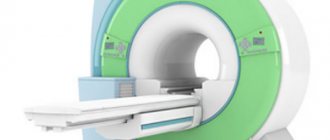Idiocy, as a severe stage of mental retardation, is a congenital disease that manifests itself during the first weeks of a child’s life, an extreme form of mental retardation. This disease is characterized by lack of speech, inability to think, and emotional underdevelopment. In severe cases, such patients are unable to move and acquire basic social skills. Failure of internal organs is also possible. A mental defect may be present from birth or from an early age. The disease is a consequence of pathologies in the nervous system, head trauma received during childbirth or in the womb, iodine deficiency. The IQ of such people rarely exceeds 20. Patients are not able to distinguish between family and friends among strangers. Diagnosis is made based on observation of the patient.
Complex of provoking factors
The development of idiocy is influenced by 2 factors: external (exogenous) and internal (endogenous), their combination is possible:
- Endogenous : hereditary metabolic disorders, gene mutations, chromosome abnormalities. Idiocy can cause Down syndrome, phenylketonuria, gargoilism, microcephaly. These pathologies are inherited in a recessive manner.
- Exogenous : infectious and toxic damaging influence factors. The first include diseases such as rubella, syphilis, and toxoplasmosis. In the second group: maternal alcoholism, Rh factor incompatibility, uncontrolled use of certain medications during pregnancy.
Birth injuries, asphyxia of the newborn, and intracranial hematomas can aggravate the situation. Although they are not independent causes of dementia.
Causes
Causes of idiocy:
- genetically determined diseases associated with chromosomal defects, manifested by mental retardation and physical underdevelopment (Williams, Down, Angelman, Prader-Willi syndromes, Tay-Sachs disease) - today about 2000 gene aberrations (mutation) are known, their number increases every year;
- various poisonings of the mother during pregnancy;
- irradiation;
- abuse of alcohol, drugs, and medications by the expectant mother;
- infection during gestation: cytomegalovirus (human herpesvirus type 5, which has its own DNA), rubella (a viral disease dangerous for pregnant women in the early stages of gestation), syphilis (a venereal disease caused by a pale spirochete), toxoplasmosis (infection with parasites - toxoplasma), simple herpes and other dangerous infections;
- poor nutrition with deficiency of vitamins and microelements, malnutrition;
- iodine deficiency in the expectant mother;
- metabolic diseases in pregnant women;
- newborn asphyxia (absence or irregular breathing);
- trauma to the child during childbirth, head injury, head compression, hemorrhage during delivery;
- iodine deficiency in a child under 3 years of age;
- encephalitis, meningitis (acquired in childhood);
- prematurity (infant weighs less than a kilogram at birth).
The majority of parents of children with idiocy do not have mental developmental disabilities. The health of parents does not mean the birth of a full-fledged child.
Forms and types of disease
There are two forms of idiocy:
- Torpid form . The patients are immobilized and seem to be absent in time and space. If left to their own devices, they will lie passively in bed for days.
- Excitable form . Patients are in a constant pendulum-like movement: they sway from side to side, beat their heads rhythmically against the headboard or wall, mechanically tear out tufts of hair from their heads, and scratch their faces.
The main types of idiocy are determined by the following signs and symptoms:
- Amaurotic idiocy. A very rare, rapidly progressing disease that occurs in two directions. Vision quickly declines due to damage to the retina, which leads to partial loss or complete blindness. Dementia is approaching by leaps and bounds.
- Congenital amaurotic . It appears in infancy and is accompanied by convulsions, hydrocephalus, and sharply reduced muscle tone.
- Early childhood . The moment when symptoms appear is in the first year of life: rapidly increasing blindness and a sharp decline in intellectual development.
- Late children's . The age of detection is up to five years. Symptoms of the disease (convulsions, loss of vision, dementia) increase gradually.
- Youthful . It appears at early school age - up to 10 years. Characterized by decreased memory, intelligence, motor, endocrine and autonomic disorders.
- Late . This type can only be diagnosed in adults. Symptoms of organic brain damage, pathology in the cerebellum, and hearing loss begin to appear.
- Dysostotic . Inherited defect of bones, joints, higher nervous system, severe illnesses of internal organs.
- Hydrocephalic . It is provoked by congenital hydrocele of the brain.
- Myxedema . The development of the disease begins against the background of improper functioning of the thyroid gland.
- Moral . Mental activity is quite intact. The emotional-volitional sphere suffers more.
Forecasts
With idiocy, complications develop such as social maladaptation, dangerous behavior with aggression often directed at oneself.
The child may be injured due to visual and motor impairments. Weak physical activity leads to congestive pneumonia (develops as a result of impaired hemodynamics and pulmonary ventilation). Seizures may result in the development of status epilepticus.
Dysphagia (impaired swallowing) is dangerous due to food entering the trachea and the development of aspiration pneumonia (damage to the lung parenchyma). Violation of lipid metabolism leads to fatty hepatosis (excessive accumulation of fat in the liver) and liver failure. Heart failure is caused by fat deposits on the valves. They die more often from respiratory or heart failure, secondary infections aggravating the course of the underlying disease.
The most unfavorable prognosis is for Tay-Sachs amaurotic idiocy, the infantile form of which is fatal. The late form develops most slowly and has a benign course, so the prognosis is relatively favorable. In most cases, patients live no more than 20 years.
Thanks to careful care, medical supervision, and drug maintenance therapy, patients can live 40 years. It is impossible to recover from idiocy.
Stages of disease progression
Mild, moderate and severe degrees of idiocy are essentially not much different from each other
With mild to moderate mental retardation, the patient can be taught the simplest things. They have more developed sensitivity.
They can distinguish cold from hot, high from low. Patients are able to provide basic care for themselves. They recognize their relatives or guardians, showing joy when they appear. They can construct simple sentences from a couple of words and respond to their name.
Severe degree is the patient’s complete exclusion from life. Oligophrenics with deep idiocy have difficulty moving, or do not know how to walk at all, their movements are erratic and uncoordinated. They don't recognize their relatives.
The sensitivity threshold is very low: they do not respond to pain, as well as to other irritants. They do not know how to get out of bed on their own, falling to the floor during such attempts. Patients do not speak, occasionally making only inarticulate sounds.
This degree is characterized by profound disability. As an individual, a person is not present in society. Serious idiots spend their lives in psychoneurological boarding schools. Lifespan is about 40 years.
Treatment
The therapeutic effect depends on what stage of idiocy the patient is at. With a mild degree, patients can develop, learn basic self-care and communication skills, and acquire a minimal outlook. The main thing that patients need is care and observation. Medicines are effective when used in the early stages of the disease.
Pharmacological agents include sedatives for increased excitability and aggression, psychotropic drugs (neuroleptics) for severe mental disorders, nootropics for neurodegenerative disorders, vitamins, and anticonvulsants for convulsive syndrome.
Features of childhood idiocy
Idiocy is noticeable from early childhood. Children are severely delayed in psychomotor development. They begin to hold their head up, sit down, and stand very late; for many, walking remains an unattainable progress. Even after learning to walk, they do so awkwardly, often falling and stumbling.
These children do not experience emotions, they do not cry, do not laugh, react to stimuli only with screaming and anger, or do not show any reaction at all. Even sharp sounds and bright spotlights will not make the child flinch or squint.
If a baby puts his hand on a hot stove, he will not pull it away, but will stand and scream. A low pain threshold, however, even dulls the feeling of pain so much that the victim may practically not feel it. They are not subject to any form of meaningful activity.
Such children are easy to recognize on the street: they have too small or large heads, defects in the structure of the face: cleft lip, deformed ears, cleft palate, uneven row of ugly teeth.
Neurological symptoms: facial asymmetry, squint, drooping eyelid, blank, frozen facial expression, the mouth is constantly open because the excessively thick tongue does not fit in the mouth. Urinary and fecal incontinence, constant drooling due to difficulty swallowing.
Children do not study in correctional classes: this is a privilege for students with mild mental retardation; parents must provide such children with care and supervision around the clock. A grown child is usually not left in the family due to progressive dementia.
What is idiocy?
Idiocy is a disease of extreme mental retardation when the coefficient reaches or is below 20 points. Such a person can be compared to a child who has not reached his 3rd birthday. He cannot speak or pronounces individual syllables or words. He is unable to form sentences, and if he tries to do so, his sentences are full of meaninglessness.
Such individuals have no or very reduced thinking. They may not recognize their loved ones. As for any skills, they may be completely or practically absent. Idiots are unteachable. They cannot even learn self-care skills so as not to need outside help.
Persons suffering from idiocy live at the level of pleasure: like/dislike, pleasant/unpleasant. They may have an excessive appetite. Moreover, they can even put something inedible, hot or cold, spicy or salty, into their mouth. They can even eat their own excrement.
The functions of their pelvic organs are not consciously controlled, so idiots have to wear diapers all their lives. Their range of interests is very limited: sleep, food, sexual desire. Moreover, the sexual preferences of older patients are so perverted that they can manifest themselves in public. Most of the time, idiots may stare at one point, sway from side to side, clap their hands, or bang their heads against the wall.
Patients with idiocy are difficult to teach anything because their pain threshold is very low. They can endure cold, burns and other discomforts that are unbearable for an ordinary person. Patients can swallow food in whole pieces without chewing, so they need to serve food in crushed form.
Idiocy manifests itself not only in the intellectual level of the individual, but also affects his physiological development. The following developmental defects are often observed in idiots:
- Macro- or microcephaly.
- Dwarfism or gigantism.
- Obesity.
- Congenital pathologies of the structure of the arms and legs.
- Distorted facial structure.
- Neurological disorders.
- Heart defects.
- Diseases of the endocrine system.
- Down syndrome.
- Gargoilism.
- Phenylketonuria.
No matter how much loved ones love their family member, it is hard to take care of an idiot. Often such patients are sent to special boarding schools for psychochronic patients, where they are provided with qualified care and constant treatment.
There is no point in saying that a person with idiocy can be cured, since the disease is congenital. Often the reasons indicate the impossibility of reversing the idiocy with which a person has to live his whole life.
go to top
Diagnostics and tests
The disease is diagnosed by pediatricians, neurologists and psychiatrists. Pediatricians make a conclusion based on observation of the child from birth.
Neurologists and psychiatrists assess the emotional and mental state, the level of IQ, thinking, and the degree of development of reflexes.
To clarify the extent of brain damage, MRI and computed tomography are performed. The data from these studies will help make the correct diagnosis. The picture is completed by collecting anamnesis and identifying the role of hereditary factors.
If idiocy is suspected, the patient is tested in three main areas:
- level of intelligence development;
- the ability to make logical conclusions;
- analysis of the speech development of the test taker.
Mental retardation in the severe stage does not pass the test of giftedness.
Photo selection and video of patients with idiocy:
How to treat idiocy?
Experts do not yet have effective treatment methods. Idiocy cannot be treated or corrected. Doctors have to constantly monitor and care for them. Only in some cases is surgery possible to remove part of the brain.
Typically, patients with idiocy are placed in special boarding homes, where they are constantly taught basic skills and also provided with care. It is impossible to completely recover from the disease in question. Some patients do not live to old age.
go to top
Directions of therapy: goals and opportunities
Idiocy cannot be cured due to the fact that this pathology is congenital and has a recessive inheritance.
Treatment consists of two main areas:
- specific , aimed at the cause that caused the pathology;
- symptomatic , which alleviates the patient’s suffering and is aimed at combating the consequences.
Specific treatment:
- Forms of idiocy associated with a lack of any enzymes in the body are treated by replenishing their deficiency. To do this, the patient is prescribed a diet with foods that contain substances missing in the body (proteins, vitamins, amino acids, minerals).
- A disease caused by disruptions in the endocrine system is corrected with hormonal and auxiliary therapy . Stimulating hormones, analogs of natural hormones, as well as barbiturates, pantocrine, and spermine are widely used.
- Toxoplasmosis and syphilis acquired in utero are treated with antiparasitic drugs (Pyrimethamine in combination with Sulfadoxine, Lincomycin, Clindomycin). To this are added antibiotics (Doxycycline) and antimicrobial (Metronidazole) agents.
Symptomatic treatment
In case of increased cranial pressure, the following is carried out:
- dehydration with diuretics (Furosemide, Sidnocarb, Lasix);
- pain relief to relieve severe headaches (Ketonal, Nimesil, Ketorolac);
- improve blood supply to the brain with subsequent outflow of cerebrospinal fluid; therapy is carried out using nootropics (Piracetam, Vinpocetine, Phenibut, Phenotropil).
Vitamins and metabolic preparations help improve metabolism and strengthen the immune system:
- Actovegin;
- Mexidol;
- Cavinton;
- Cytoflavin;
- B vitamins.
Excitability is reduced by antipsychotics:
- Aminazine;
- Triftazin;
- Etaperazine;
- Haloperidol;
- Tizercin.
Lethargy is treated with psychostimulants, which include:
- amphetamines;
- phenamines;
- Nootropil;
- Meridol.
Epilepsy attacks are treated with anticonvulsants:
- Carbamazepine;
- Valparim;
- Apilepsin;
- Phenobarbital.
Patients are prescribed physical therapy in a group method, or at home, massage, physiotherapy, and hydrotherapy. It is impossible to cure idiocy, but it is quite possible to alleviate the condition of patients if they are provided with the full range of therapeutic and rehabilitation measures.
general information
Oligophrenia is a metabolic disease of a hereditary nature. Its essence is quite difficult to understand for a person far from medicine. In short, the patient’s body lacks the enzyme involved in the process of phenylalanine metabolism, and the result of this is that phenylalanine along with metabolites begins to accumulate in the child’s body.
This negatively affects the functioning of the central nervous system, causing a toxic effect. Well, this, in turn, inhibits mental development, which gradually results in mental deviations. It is impossible to say when this disease first appeared; it is only known that A. Felling first undertook to describe it in 1934. This disease is sometimes called dementia.
Is it possible to prevent decline in intelligence?
All precautions to prevent the development of a terrible disease consist of primary and secondary prevention:
- Primary . It consists of constant consultation of the pregnant woman with a gynecologist, undergoing genetic testing of the fetus for early detection of developmental anomalies. Caring for the health of the expectant mother, timely treatment of infectious diseases, giving up habits that can have a detrimental effect on the formation and development of the fetus.
- Secondary . Early detection, comprehensive treatment and rehabilitation of such patients. Therapeutic measures, including occupational therapy and the work of speech pathologists, can together give a good result.
Prevention
Prevention of the disease mostly concerns maintaining a healthy lifestyle during pregnancy. It is necessary to completely give up smoking and alcohol, do not forget to visit a gynecologist, register, take walks in the fresh air, and sleep the right amount of time. Proper balanced nutrition, avoidance of unhealthy fatty foods, and consumption of greens, vegetables and fruits deserve special attention.
People with idiocy are almost unable to live in the natural environment, which is why they are placed in special boarding schools. This is especially necessary for those diagnosed with severe mental retardation.
We described what this is in the article. And understanding how complex this pathology is, I would like to emphasize: no matter what a person is, it is necessary to treat him with respect and try to make his existence easier.
Key tasks of a teacher with various mental disabilities
With debility, the main task is to develop simple work skills, as a result of which such patients are subsequently able to engage in unskilled paid labor.
With the development of imbecility, the main task is to develop self-care skills in the patient.
With idiocy, the only question is maintaining the vital functions of the body. Unfortunately, with such a severe form of debility, patients resemble plants that cannot lead life in society.






